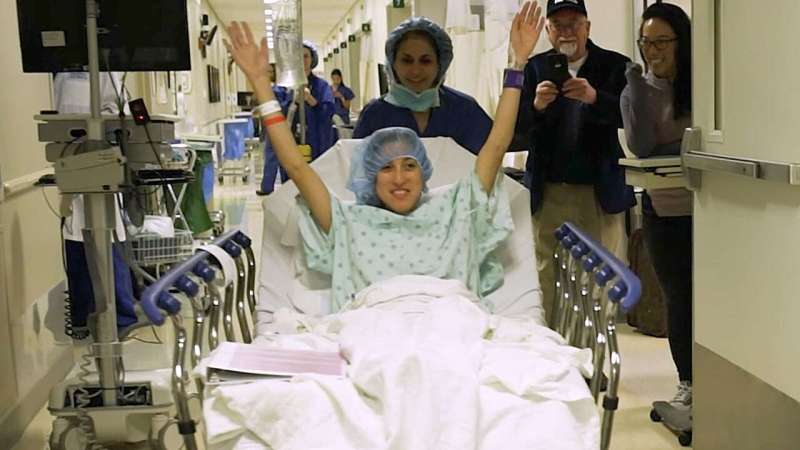This article has been reviewed according to Science X's editorial process and policies. Editors have highlighted the following attributes while ensuring the content's credibility:
fact-checked
trusted source
proofread
Study shows positive outcomes for first three US living HIV-to-HIV kidney transplant donors

Based on findings from a study published today in The Lancet Regional Health—Americas, researchers at Johns Hopkins Medicine and three collaborating medical institutions suggest that people living with the human immunodeficiency virus (HIV) who donate a kidney to other people living with HIV (PLWH) have a low risk of developing end-stage kidney disease (ESKD) or other kidney problems in the years following the donation.
"This new evidence is proof-of-concept that donating a kidney can be safe for people living with HIV," says Christine Durand, M.D., associate professor of medicine at Johns Hopkins Medicine and medical director of the Johns Hopkins Transplant Research Center. "When added to the consistently positive outcomes documented for recipients of these organs, our study provides support that living donations from people with HIV to recipients with HIV can and do work."
When the HIV Organ Policy Equity (HOPE) Act was enacted in 2013, it enabled people diagnosed with HIV to legally donate organs to others living with the virus and in need of transplants, as part of approved clinical research studies. The first living donor HIV-to-HIV kidney transplant in the United States under the HOPE Act was done at Johns Hopkins Medicine in March 2019.
For the new study, the donor in that historic operation, Nina Martinez, along with the second and third PLWH in the nation to undergo the procedure, were monitored for two to four years post-transplant to document and assess their long-term outcomes.
The study was conducted at selected centers within the HOPE in Action Consortium, a U.S. group involving some 30 transplant centers approved to do HIV-to-HIV deceased donor kidney and liver transplants. A few of the centers have active protocols to perform living donor HIV-to-HIV kidney transplants, which remain restricted to research.
The reason for the study, the researchers explain, was to address concerns that nephrectomy (surgical removal of a kidney) might increase the risk of ESKD in living donors with HIV. PLWH are known to be at higher risk of kidney disease resulting from HIV infection, liver toxicity from antiretroviral therapies (medications used to keep HIV in check), hypertension and diabetes.
Martinez, age 35 at the time of donation, and the other two donors studied—Karl Neumann, age 52 at the time, and Reed Benedict, age 47 at the time—all agreed to be named within this paper and are listed as study authors.
They were evaluated at HOPE in Action Consortium centers at three months, six months and annually for two to four years following their nephrectomies. The visits included a physical exam, sample collection for laboratory work, and interviews to document any hospitalizations, medication changes, serious adverse effects in general, or three or more nephrectomy-related adverse effects.
Pre-transplant biopsies for all three donors had shown no kidney disease. Additionally, the pre-transplant nine-year risk for developing ESKD was calculated for each of the donors, with all having low risks.
To assess kidney function, the researchers used a common blood test for measuring the level of a waste product called creatinine. The amount of creatinine found, when plugged into a mathematical formula, determined each donor's estimated glomerular filtration rate (eGFR), the ability of their remaining kidney to filter waste products and fluids from the body as urine.
At two, three and four years assessment following donation, all three donors experienced slight decreases in eGFR. However, the study authors say these changes were expected, are comparable to post-transplant eGFR decreases seen in kidney donors who do not live with HIV, and do not indicate that the donors in this study are progressing toward chronic kidney disease or kidney failure. The authors also report that all nephrectomy-related adverse effects that arose were easily managed.
"Hopefully, our findings demonstrating positive outcomes for these three people living with HIV who donated a kidney will encourage other Americans living with HIV to consider living donation," says Durand. "Having more organs available for HIV-to-HIV transplants helps everyone waiting on a transplant, regardless of HIV status, and could save hundreds of lives each year."
Durand and her colleagues caution that the lifetime risk of ESKD in PLWH who become living donors remains unknown. They say that larger studies with longer periods of following donors are needed to address that concern.
"Knowing the importance of organ donation, I was thrilled that the HOPE Act made it possible for me to become both a registered deceased organ donor and the nation's first living donor with HIV," says Martinez. "With the findings from our study and hopefully, those from research to come, another barrier to living donor HIV-to-HIV kidney transplants—the concern that the donor's remaining kidney cannot function independently of the donated organ—is being erased."
More information: Christine M. Durand et al, Living kidney donors with HIV: experience and outcomes from a case series by the HOPE in Action Consortium, The Lancet Regional Health—Americas (2023). DOI: 10.1016/j.lana.2023.100553




















